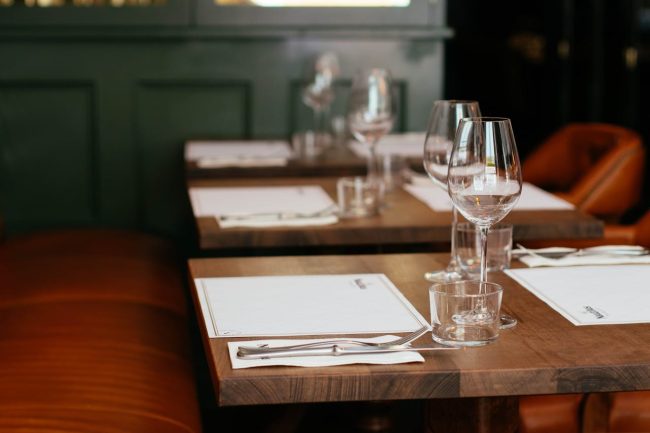
Dining out is more than just enjoying a meal; it’s also about respecting the people who make your experience possible. For many servers, tips are a vital part of their income. Unfortunately, not everyone is aware of the impact their tipping habits have on waitstaff. Bad tipping isn’t just about money—it can also feel disrespectful and demoralizing for those working hard to serve you. Understanding what waitstaff consider the rudest tipping habits can help you avoid making a negative impression. By being aware of these behaviors, you can ensure your dining experiences are positive for everyone involved and avoid some common pitfalls in tipping etiquette.
1. Leaving No Tip for Small Orders
One of the rudest tipping habits, according to waitstaff, is leaving nothing for small orders, like just a coffee or dessert. While the bill might be tiny, the effort to serve you is still there. Servers often rely on tips to make up for low hourly wages, and even small orders take up their time and attention. Leaving a small tip shows you appreciate their service, no matter how little you spent. Skipping the tip entirely sends a message that their work isn’t valued.
2. Tipping in Loose Change
Handing over a pile of coins as a tip may seem harmless, but many servers find it disrespectful. While every penny counts, using mostly nickels and pennies can come off as dismissive. It suggests you didn’t think their service was worth a couple of bills. Using proper bills or at least quarters helps your tip feel more intentional and less like an afterthought. If you’re short on cash, consider adding a tip to your card instead.
3. Writing Advice or Jokes Instead of Tipping
Leaving a note with advice, a joke, or even a smiley face in place of a tip is one of the most frustrating tipping habits. Servers have seen everything from “Smile more!” to “God bless!” written on receipts—without a dollar to show for their work. While you may think you’re being friendly or uplifting, it doesn’t help pay the bills. Tipping is about acknowledging service, not offering personal commentary or humor.
4. Calculating Tips to the Exact Cent
Some diners carefully calculate their tip down to the last penny, often leaving odd amounts like $1.23. While being precise isn’t inherently rude, it can feel petty and impersonal. Waitstaff say that rounding up your tip is a small gesture that shows appreciation. It also makes it easier for servers to handle cash at the end of their shift. Being slightly generous—rather than overly exact—goes a long way in making your gratitude clear.
5. Tipping Based on Pre-Discounted Totals
Using coupons or discounts can save you money, but tipping on the discounted total is a common tipping habit that frustrates servers. The amount of work they put in doesn’t change just because you got a deal. Many waitstaff rely on tips to make their living wage, and reduced tips can make a tough job even harder. Always tip based on the full, pre-discounted price to show you value their effort and time.
6. Justifying Low Tips Due to Restaurant Policies
Some diners leave smaller tips if they’re unhappy with things like food quality, slow kitchen service, or restaurant policies—issues often outside the server’s control. Blaming the waitstaff for problems they can’t fix is one of the rudest tipping habits. Instead, address complaints with management or through feedback forms. Your tip should reflect the service provided by your server, not unrelated frustrations.
7. Not Tipping on Takeout Orders
There’s debate about tipping for takeout, but many waitstaff say that ignoring tips for to-go orders is still rude. Even though you’re not sitting down, staff often pack your food, check your order, and make sure everything is ready for you. A small tip for takeout is a simple way to show you recognize their effort. If you’re unsure how much to leave, even a dollar or two is appreciated.
8. Making a Show of a Bad Tip
Some customers make a point of handing over a low tip with a comment or gesture, as if to send a message. This kind of behavior is one of the most pointedly rude tipping habits. It not only embarrasses servers but also makes an already tough job feel worse. If you have concerns about service, offer polite feedback or speak with a manager instead of making a public display.
How to Show Respect Through Your Tipping Habits
Good tipping habits aren’t just about following a social norm—they’re about showing respect for the hard work of waitstaff. Small actions, like rounding up your tip or adding an extra dollar for takeout, can have a big impact on someone’s day.
Being mindful of your tipping habits helps create a positive dining environment and supports the people who make your meals enjoyable. Next time you eat out or pick up food, consider how your actions might impact your server. A little consideration goes a long way in making the service industry better for everyone.
What tipping habits have you noticed—good or bad—when dining out? Share your thoughts in the comments below!
What to Read Next…
- Tipping Etiquette
- 6 Things You Should Never Say to a Waitress If You Want a Good Dining Experience
- Dining Out with Friends 6 Situations When Splitting the Bill Is Actually Unfair
- 11 Obnoxious Things You Should Stop Doing at Upscale Restaurants
- How Important Is Service

Travis Campbell is a digital marketer and code developer with over 10 years of experience and a writer for over 6 years. He holds a BA degree in E-commerce and likes to share life advice he’s learned over the years. Travis loves spending time on the golf course or at the gym when he’s not working.




